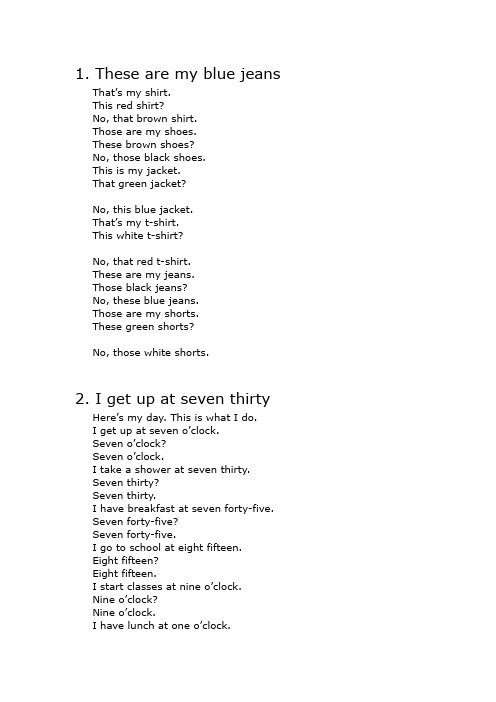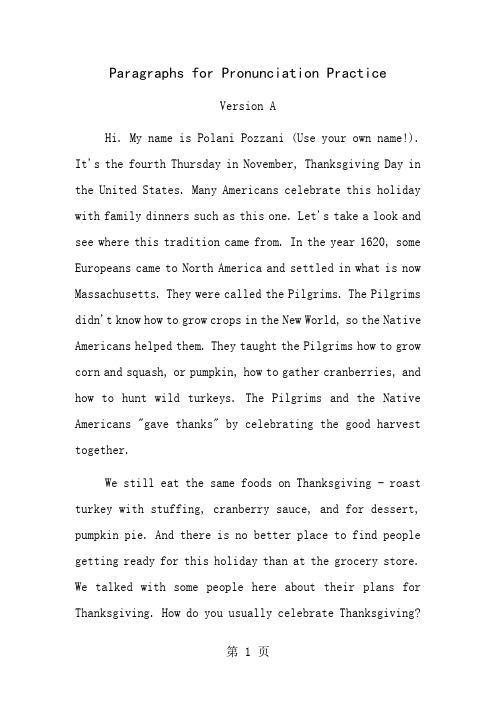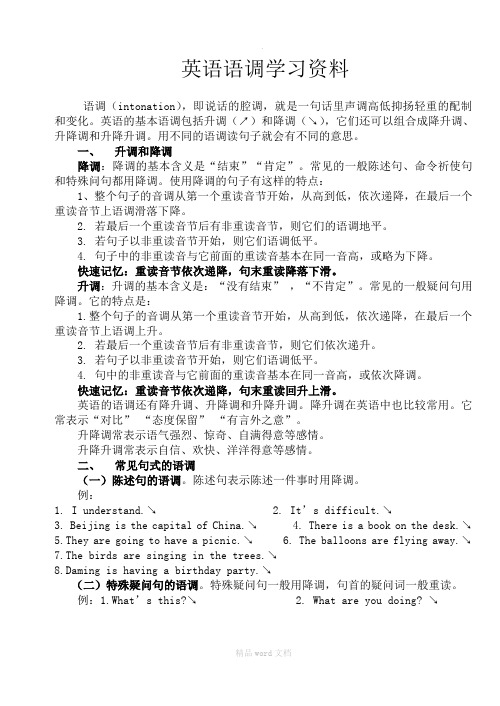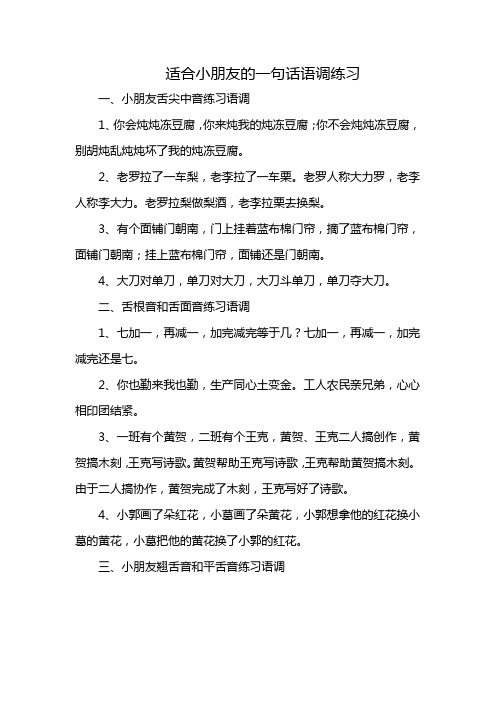语调训练初级材料
普通话语音训练材料

普通话语音训练材料普通话(Mandarin Chinese)作为中国官方语言,是中国人民共和国的标准语言和全球汉语共同语。
为了提高普通话发音的准确性和流利度,以下是一些普通话语音训练的材料,帮助您提升普通话口语水平。
一、声母练习1. b:比、不、白、北、半、本、变、包、表、别2. p:皮、批、平、派、培、盼、排、篇、披、票3. m:米、迷、面、毛、亩、梦、莫、明、满、门4. f:非、飞、分、发、夫、幅、妇、服、复、佛5. d:的、地、大、对、得、道、底、德、都、冬6. t:他、她、天、头、听、同、条、提、题、厅7. n:您、呢、拿、南、难、年、内、那、能、女8. l:了、来、里、离、理、路、绿、六、流、老9. g:给、个、国、过、工、干、感、公、高、告10. k:快、可以、开、空、看、考、克、客、口、苦11. h:好、和、后、会、回、红、黑、害、汉、火12. j:家、间、见、将、接、机、级、叫、进、金13. q:起、情、求、千、前、钱、晴、亲、去、青14. x:下、先、现、想、向、相、写、些、心、小15. zh:知、只、之、真、主、庄、中国、中、展、正16. ch:出、吃、车、长、场、重、城、成、小伙儿、吹17. sh:时、使、是、世、山、商、市、受、说、少18. r:人、入、热、如、日、软、瑞、然、让、认二、韵母练习1. a:啊、阿、爸、巴、把、八、哈、杀、沙、刷2. o:哦、喔、噢、区、哥、狗、贺、葛、过、锅3. e:额、饿、娥、恶、俄、哦、讹、莪、谔、鳄4. i:衣、医、一、宜、移、仪、已、易、议、疑5. u:乌、委、污、亡、务、五、午、吴、武、舞6. ü:坞、雾、妩、恶、无、丑、沃、屋、烏、谔7. ai:爱、埃、挨、哀、癌、安、鹌、靓、爱好、噯8. ei:诶、欸、诶克、我、喂、蔚、尾、卫、未、胃9. ao:熬、骜、凹、奥、澳、袄、傲、嗷、涛、遨10. ou:讴、欧、殴、呕、偶、希区、趴、殴打、后、欧洲11. an:安、按、俺、岸、案、暗、胺、黯、谙、铵12. en:恩、嗯、奀、而、恩人、额、砟、俄然、硯13. ang:昂、肮、盎、昂贵、央、恶心、茫、藏、香、冠14. eng:嗯、伧、鞥、朗、绫、薎、鳩、阵、戆、阿鲁15. ong:翁、怂、耸、悚、淙、薇蓉、走、空、气冲冲、多不胜数三、声调练习普通话有四个声调:平声、上声、去声和入声。
语音训练材料

第一个音:平卷舌。
平卷舌是普通话中一个重要的部分,很多人无法区分平卷舌,这种普通话不标准是很明显的。
z cs 发这三个声母时,舌头平伸,舌尖与上赤背接触形成阻碍。
zh ch sh 发音时,舌尖上翘,与硬腭前部接触形成阻碍。
那么我们怎么来训练呢,有以下几种方法:1、对比训练(1)词组对比栽z āi 花hu ā-摘zh āi 花hu ā 昨zu ó夜y è-卓zhu ó越yu è 祖z ǔ父f ù-嘱zh ǔ咐f ù 租z ū子z ǐ-珠zh ū子z ǐ 暂z àn 时sh í-战zh àn 士sh ì 造z ào 就ji ù-照zh ào 旧ji ù 资z ī源yu án -支zh ī援yu án 自z ì愿yu àn -志zh ì愿yu àn 字z ì纸zh ǐ-制zh ì止zh ǐ 辞c í职zh í-赤ch ì字z ì 自z ì立l ì—智zh ì力l ì 粗c ū布b ù—初ch ū步b ù 擦c ā车ch ē—叉ch ā车ch ē史sh ǐ记j ì—死s ǐ记j ì 栽z āi 花hu ā—摘zh āi 花hu ā(2)组词对比作zu ò者zh ě 滋z ī长zh ǎng 种zh ǒng 族z ú 转zhu ǎn 载z ǎi 残c án 春ch ūn 操c āo 场ch ǎng 冲ch ōng 刺c ì 揣chu ǎi 测c è飒s à爽shu ǎng 私s ī事sh ì 疏sh ū松s ōng 世sh ì俗s ú 财c ái 产ch ǎn 声sh ēng 色s è2、听辨训练师sh ī长zh ǎng—司s ī长zh ǎng 商sh āng 业y è—桑s āng 叶y è 乱lu àn 草c ǎo —乱lu àn 吵ch ǎo 私s ī人r én —诗人 推tu ī辞c í—推tu ī迟ch í 三s ān 角ji ǎo —山sh ān 脚ji ǎo 主zh ǔ力l ì—阻z ǔ力l ì 征zh ēng 兵b īng—增兵 棉mi án 纸zh ǐ—棉mi án 籽z ǐ 竹zh ú子z ǐ—卒c ù子z ǐ 事sh ì实sh í—四s ì十sh í 诗sh ī人r én—私人 鱼y ú翅ch ì—鱼y ú刺c ì 最zu ì粗c ū—最zu ì初ch ū 摘zh āi 桃t áo —栽z āi 桃t áo3、绕口令训练:(1)山sh ān 上sh àng 住zh ù着zhe 三s ān 老l ǎo 子z ǐ,山sh ān 下xi à住zh ù着zhe 三s ān 小xi ǎo 子z ǐ,山sh ān 腰y āo 住zh ù着zhe 三s ān哥g ē三s ān 嫂s ǎo 子z ǐ。
语调训练初级教材

1. These are my blue jeansThat’s my shirt.This red shirt?No, that brown shirt.Those are my shoes.These brown shoes?No, those black shoes.This is my jacket.That green jacket?No, this blue jacket.That’s my t-shirt.This white t-shirt?No, that red t-shirt.These are my jeans.Those black jeans?No, these blue jeans.Those are my shorts.These green shorts?No, those white shorts.2. I get up at seven thirtyHere’s my day. This is what I do.I get up at seven o’clock.Seven o’clock?Seven o’clock.I take a shower at seven thirty.Seven thirty?Seven thirty.I have breakfast at seven forty-five.Seven forty-five?Seven forty-five.I go to school at eight fifteen.Eight fifteen?Eight fifteen.I start classes at nine o’clock.Nine o’clock?Nin e o’clock.I have lunch at one o’clock.One o’clock?One o’clock.I go home at five fifteen.Five fifteen?Five fifteen.I have dinner at seven thirty.Seven thirty?Seven thirty.I go to bed at ten forty-five.Ten forty-five?Ten forty-five.And then I st art all over again…3. I do karaoke on WednesdaysMondays, Mondays.What do you do on Mondays?On Mondays I usually listen to jazz music.Tuesdays, Tuesdays.What do you do on Tuesdays?On Tuesdays I sometimes go for a drive.Wednesdays, Wednesdays.What do you do on Wednesdays?On Wednesdays I always play the guitar.Thursdays, Thursdays.What do you do on Thursdays?On Thursdays I often go to a rock concert.Fridays, Fridays.What do you do on Fridays?On Fridays I always do karaoke.Weekends, weekends.What do you do on weekends?On weekends I usually stay in bed!4. I can play basketball.Yoga, yoga, I can do yoga.Can you do yoga, too?I can’t do yoga, but I can do karate.Can you do karate, too?I can’t do karate, but I can play baseball.Can you play baseball, too?I can’t play baseball, but I can ice-skate.Can you ice-skate, too?I can’t ice-skate, but I can ski.Can you ski, too?I can’t ski, but I can play volleyball, too?Can youplay volleyball, too?5. Where can I buy a ticket?Excuse me, where’s the coffee shop?Not here! It’s behind the ticket office.Excuse me, where’s the coffee shop?Not here! It’s across from the exit.Excuse me, where’s the coffee shop?Not here! It’s between the phone booths and the luggage lockers.Excuse me, whe re’s the coffee shop?Not here! It’s in front of the restrooms.Excuse me, is this the coffee shop?Yes, it is. But sorry, it’s closed!6.I'm babysitting on Monday.Would you like to go out on Monday?No, sorry, I can?t.Why not?I'm babysitting on Monday.Would you like to go out on Tuesday?No, sorry, I can't.Why not?I'm doing my laundry on Tuesday.Would you like to go out on Wednesday?No, sorry, I can't.Why not?I'm working overtime on Wednesday.Would you like to go out on Thursday?No, sorry, I can't.Why not?I'm working out on Thursday.Would you like to go out on Friday?No, sorry, I can't.Why not?I'm visiting relatives on Friday.Would you like to go out on weekend?Well? maybe!7.Add some salt & pepperWash, wash, wash the lettuce.Slice, slice, slice the cheese.Put some butter on the bread.Can I have my sandwich, please?Fry, fry, fry the tomatoes.Put them on a pizza base.Add some cheese and bake it slowly.Mmm. Can I have a taste?8.I have a headacheHead, head, I have a headache.I have a headache,And my eyes hurt!Stomach, stomach, I have a stomach ache.I have a stomach ache,And I have the flu!Ear, ear, I have an earache.I have an earache,And I have a fever!Tooth, tooth, I have a toothache.I have a toothache,And a sore throat!Back, back, I have a backache.I have a backache,And my knee hurts!I have a headache, I have an earache,A toothache, a backache,And a sore throat.My eyes hurt, my knee hurts, I have a stomach ache.I have a fever,And I have the flu!Oh, dear. Next, please!9.I'll have soup, pleaseWhat would you like for your appetizer?I'll have soup.I'll have salad.I'll have salad, too.Two salads and one soup for table number two.What would you like for your entree?I'll have fish.I'll have beef.I'll have stir-fried pork.One fish, one beef, one stir-fried pork for table number four.What would you like for your dessert?I'll have ice cream.I'll have fruit tart.Nothing, thanks, for me.One ice cream and one fruit tart for table number three. 10.I got engaged in JanuaryA: Did you hear the gossip? Did you hear the news?B: No, I didn't, what's the story? Tell me all the news!A: Well, Mr. Smith retired last month.B: Mr. Smith retired?A: And Mrs. Jones moved last week.B: Mrs. Jones moved?A: Mr. Green got married in June.B: Mr. Green got married?A: And a week ago, Dick Harper died.B: Dick Harper died?A: I think that's it. I'd better go! I have a lot to do.B: Well, thanks a lot. It was really good to talk to you.B: Did you hear the gossip? Did you hear the news?C: No, I didn't, what's the story? Tell me all the news!B: Well, Mr. Smith retired last month.C: Mr. Smith retired?B: And Mrs. Jones moved last week.C: Mrs. Jones moved?B: Mr. Green got married in June.C: Mr. Green got married?B: And a week ago, Dick Harper died.C: Dick Harper died?B: I think that's it. I'd better go! I have a lot to do.C: Well, thanks a lot. It was really good to talk to you.11.My computer's crashedComputer, computer,I love my computer.My printer, my keyboard, my mouse.I never have problems,I use it all day.I never go out of the house!Computer, computer,I hate my computer.My modem, my disk drive, my screen.I always have problems,It?s driving me crazy.Computers make me want to scream!12.He's passed his driving testUpset, upset,I'm really upset.I've had an argument with my boyfriend,I'm really upset.Relieved, relieved,I'm really relieved.I've found my wallet,I'm really relieved.Disappointed, disappointed,I'm really disappointed,I've failed my driving test,I'm really disappointed.Thrilled, thrilled,I'm really thrilled.I've won the lottery,And now I'm rich!13.May I switch off the light?May I turn down the air conditioning?Do you mind if I lower the blind?Is it all right if I put away these files?I don't mind! I don't mind! I don't mind!Is it all right if I switch off the light?Do you mind if I close the door?May I switch on the fan?Sure! Sure! Sure!14.I twisted my ankleOw!What happened?I was lifting a heavy bag and I hurt my back!Ow!What happened?I was changing a light bulb and I got an electric shock!Ow!What happened?I was slicing an onion and I cut my finger!Ow!What happened?I was making some tea and I burned my hand!Ow!What happened?I was climbing a ladder and I fell off and broke my leg!15.I feel so embarrassedI'm frustrated! My computer?s been crashing all day.I'm heartbroken. I've been fighting with my girlfriend again.I'm lonely. I've been living on my own for years.I'm confident. I've been studying really hard.I'm furious. Someone's been using my car.I'm exhausted. I've been running in the park for an hour.I'm excited. I've been thinking about my vacation.I'm irritated. He's been playing that music for hours.I'm confused. I've been trying to read this book.I'm embarrassed. I've been wearing my jacket inside out.。
英语语音语调练习初级入门

1. Try to say “YES” with different intonation and meaning:2. Now s ay “HELLO” to:- a friend you meet regularly;- a friend you haven’t seenfor a long time;- a neighbour you don’t like;- a 6 month old baby;- someone doing what heshouldn’t;- to know if someone islistening;- the same but on the phone.3. Put the stress on different words in the sentence. Does it change anything?I did not say you stole my red hat. I did not say you stole my red hat.I did not say you stole my red hat. I did not say you stole my red hat.I did not say you stole my red hat. I did not say you stole my red hat.I did not say you stole my red hat. I did not say you stole my red hat.4. Watch an episode about voice tonality. Is intonation (tonality/sentence stress/rhythm) important? Why?____________________________________________________________________________________1. Try to say “YES” with different intonation and meaning:2. Now s ay “HELLO” to:- a friend you meet regularly;- a friend you haven’t seen fora long time;- a neighbour you don’t like;- a 6 month old baby;- someone doing what heshouldn’t;- to know if someone islistening;- the same but on the phone.3. Put the stress on different words in the sentence. Does it change anything?I did not say you stole my red hat. I did not say you stole my red hat.I did not say you stole my red hat. I did not say you stole my red hat.I did not say you stole my red hat. I did not say you stole my red hat.I did not say you stole my red hat. I did not say you stole my red hat.4. Watch an episode about voice tonality. Is intonation (tonality/sentence stress/rhythm) important? Why?。
普通话训练资料

普通话训练资料普通话作为中国的标准语言,被广泛应用于各个领域。
具备流利准确的普通话口语和良好的语音语调是提升个人形象和职业竞争力的重要一环。
为了提高普通话水平,以下是一些适用于不同场景的普通话训练资料。
一、日常口语训练1. 短语练习:选择一些常用的口语短语,如问候语、道歉语、请求帮助等,每天默写10个,然后用标准的普通话口语重复多遍,形成肌肉记忆。
2. 电话对话:模拟电话对话,提高电话沟通的准确性和流利程度。
可以找一些家庭场景的对话材料,如订外卖、预约洗衣服务等。
3. 角色扮演:邀请朋友一起扮演不同的角色,进行情景对话练习。
例如,商店售货员和顾客之间的对话、医生和病人之间的对话等。
二、工作场景训练1. 行业术语学习:根据自己所在行业或感兴趣的领域,整理相关的专业术语和常用表达。
通过背诵和真实场景应用,培养用普通话讲解工作内容的能力。
2. 提问与回答:模拟面试场景,准备一系列与工作相关的问题,如经验介绍、团队合作等,用普通话进行回答并注意语音语调的准确性。
3. 演讲训练:选择自己感兴趣的话题,准备一个小型演讲,通过语速、语调和发音的训练来提高口语表达的流利度和自信心。
三、社交场合训练1. 辩论赛模拟:组织辩论赛模拟,以提高辩论能力和语言表达能力。
通过阅读相关资料,选择一些热门话题,分成正反两方进行辩论。
2. 社交用语积累:整理一份社交场合常用的普通话用语,如问候、祝贺、感谢等,通过模拟社交场合的情境,练习运用这些用语。
3. 观看普通话教学视频:利用互联网资源,观看专业普通话教学视频。
跟随视频中的教学内容,观察教师的发音、语调和嘴型等细节。
四、娱乐活动训练1. 唱歌练习:选择适合自己的中文歌曲,进行歌唱练习。
在练习过程中,注意歌词的发音准确性、歌曲的节奏感和情感表达等方面。
2. 旅游日记撰写:旅行时记录旅游日记,尽量使用普通话进行描述。
回顾日记,纠正语音语调、词汇选择和语法错误,提高旅行中用普通话进行交流的能力。
语训课件材料

语训课件材料
一、语音基础知识
本部分将介绍语音基础知识,包括音素、音标、声调、音节、语调等内容,帮助学生了解正确的发音原理和规则。
二、语音评估标准
为了更好地指导学生进行语音训练,本部分将提供语音评估标准,包括语音评估的指标、评估方法和评估标准等,以便学生了解自己的发音水平并针对性地进行训练。
三、发音技巧训练
本部分将针对发音技巧进行训练,包括唇齿舌的运用、口腔的开合度、气流的控制等,帮助学生掌握正确的发音技巧,提高发音的清晰度和准确性。
四、音调与节奏练习
本部分将注重音调和节奏的练习,通过模仿和跟读等练习方式,帮助学生掌握正确的音调和节奏,提高口语表达的流畅性和自然度。
五、口语表达技巧
本部分将介绍口语表达技巧,包括口头表达的逻辑性、连贯性和流畅性等,帮助学生提高口语表达能力,增强语言的表现力和感染力。
六、听力理解训练
本部分将进行听力理解训练,通过听录音、看视频等方式,帮助学生提高听力理解能力,加强对语言信息的捕捉和解析能力。
七、语言逻辑与思维
本部分将强调语言逻辑与思维的训练,通过分析和判断语言的逻辑性和思维方式的训练,帮助学生提高语言表达的逻辑性和思维水平。
八、日常沟通实践
本部分将注重日常沟通实践的训练,通过模拟真实场景的对话和交流练习,帮助学生提高日常沟通技能和应对能力。
九、模拟情景对话
本部分将提供模拟情景对话的练习材料,包括不同场合和情境下的对话场景和内容,帮助学生进行模拟对话练习,提高实际应用能力。
英语语音语调练习文本材料

Paragraphs for Pronunciation PracticeVersion AHi. My name is Polani Pozzani (Use your own name!). It's the fourth Thursday in November, Thanksgiving Day in the United States. Many Americans celebrate this holiday with family dinners such as this one. Let's take a look and see where this tradition came from. In the year 1620, some Europeans came to North America and settled in what is now Massachusetts. They were called the Pilgrims. The Pilgrims didn't know how to grow crops in the New World, so the Native Americans helped them. They taught the Pilgrims how to grow corn and squash, or pumpkin, how to gather cranberries, and how to hunt wild turkeys. The Pilgrims and the Native Americans "gave thanks" by celebrating the good harvest together.We still eat the same foods on Thanksgiving - roast turkey with stuffing, cranberry sauce, and for dessert, pumpkin pie. And there is no better place to find people getting ready for this holiday than at the grocery store. We talked with some people here about their plans for Thanksgiving. How do you usually celebrate Thanksgiving?Version BHow do you gauge a country's well-being? The usual approach is to look at economic indicators like GDP or employment figures, or social ones like literacy levels or crime rates. But in Britain politicians are seeking a much more basic measure of the public's well-being: its happiness. From this month, as part of an annual survey, 200,000 households in Britain will be asked some rather unusual questions. They are: How happy are you? How happy did you feel yesterday? How anxious did you feel yesterday? To what extent do you feel the things in your life are worthwhile?The large sample size means that researchers are hoping to minimise the questionnaire's margin of error. Statisticians will try to correlaterespondents' answers about happiness to other variables, such as their income or where they live. The Prime Minister David Cameron has signalled that he may allow his policies to be shaped by the responses to these questions. But Sheila Lawlor, from the think tank Politeia, thinks that politicians should fix the economy before probing the national mood, which is less measurable.。
普通话上声变调

训练材料
一、词语训练
1,上+阴:首都北京统一女兵扭亏水兵顶班
2,上+阳:搞活考察产值祖国海洋语言改良
3,上+去:解放土地巩固鼓励老化审定典范
4,上+轻:姐夫讲究比方老实倒腾老婆脑袋
好处底细铲子饺子怎么你们姐姐
奶奶姥姥早起响午讲讲等等想法单双格:有苦恼苦井水冷处理很渺小买水果好产品
双单格:管理好领导早体检表处理品采访组碾米厂
训练要求:1、先慢着横读;
2、慢着竖读;
3、有节奏快读;
4、互相考查:一组同学上台点指,另一组同学立刻读出,5个词一组.
5、按各组规律,补充一个词语.
二、语句训练
1,彼此友好买把雨伞
2,种马场有五百匹好母马.
3,我姐姐也可以把手表转给厂领导.
4,小李你给老首长打洗脸水.
5,我请雨伞厂鲁厂长选两把好雨伞给李组长.
6,我很了解你.
7,咱俩永远友好.
8,展览馆里有好几百种展览品.
训练要求:1、自己先读
2、根据语义或气息把短语或句子分出"二,三"组合的音节组,再按相应的音变规律变读―――慢读.
3、快读.
快读时,受语调的影响,个别字的变调会发生变化,和慢读时不一样,只要
语调自然,这样是可以的.但是句末的一个字的字音一定要读出214来.
三、口语中的特殊情况
形容词重叠后第二个音节,在口语中可读为阴平,但在广播中应少用或不变.
满满的早早的好好的短短的美美的
四、作业;
1、请仿照训练材料二,造出至少3个句子.
2、以这3个句子为必备材料,以"我的假日生活"为题说话.内容可虚拟.。
英语语调培训资料

英语语调学习资料语调(intonation),即说话的腔调,就是一句话里声调高低抑扬轻重的配制和变化。
英语的基本语调包括升调(↗)和降调(↘),它们还可以组合成降升调、升降调和升降升调。
用不同的语调读句子就会有不同的意思。
一、升调和降调降调:降调的基本含义是“结束”“肯定”。
常见的一般陈述句、命令祈使句和特殊问句都用降调。
使用降调的句子有这样的特点:1、整个句子的音调从第一个重读音节开始,从高到低,依次递降,在最后一个重读音节上语调滑落下降。
2. 若最后一个重读音节后有非重读音节,则它们的语调地平。
3. 若句子以非重读音节开始,则它们语调低平。
4. 句子中的非重读音与它前面的重读音基本在同一音高,或略为下降。
快速记忆:重读音节依次递降,句末重读降落下滑。
升调:升调的基本含义是:“没有结束” ,“不肯定”。
常见的一般疑问句用降调。
它的特点是:1.整个句子的音调从第一个重读音节开始,从高到低,依次递降,在最后一个重读音节上语调上升。
2. 若最后一个重读音节后有非重读音节,则它们依次递升。
3. 若句子以非重读音节开始,则它们语调低平。
4. 句中的非重读音与它前面的重读音基本在同一音高,或依次降调。
快速记忆:重读音节依次递降,句末重读回升上滑。
英语的语调还有降升调、升降调和升降升调。
降升调在英语中也比较常用。
它常表示“对比” “态度保留” “有言外之意”。
升降调常表示语气强烈、惊奇、自满得意等感情。
升降升调常表示自信、欢快、洋洋得意等感情。
二、常见句式的语调(一)陈述句的语调。
陈述句表示陈述一件事时用降调。
例:1. I understand.↘2. It’s difficult.↘3. B eijing is the capital of China.↘4. There is a book on the desk.↘5.They are going to have a picnic.↘6. The balloons are flying away.↘7.The birds are singing in the trees.↘8.Daming is having a birthday party.↘(二)特殊疑问句的语调。
1-矫正拼音练习口才练习语音语调材料

(一)打开口腔训练来龙去脉老马识途浪子回头老当益壮雷厉风行两袖清风燎原烈火包罗万象刀山火海调兵遣将防患未然光明磊落高风亮节豪情壮志浩浩荡荡娇生惯养慷慨激昂脑满肠肥庞然大物乔装打扮相辅相成逍遥法外阳关大道咬牙切齿高朋满座造谣惑众招摇过市来日方长狼狈不堪牢不可破老生常谈冷嘲热讽量力而行龙腾虎跃超群绝伦道貌岸然泛滥成灾放虎归山广开言路高瞻远瞩好大喜功江河日下矫枉过正冒名顶替鸟语花香抛砖引玉相安无事响彻云霄扬长而去遥相呼应耀武扬威早出晚归张冠李戴高文典册(二)声调训练中国伟大山河美丽工农子弟千锤百炼山明水秀花红柳绿(三)绕口1、双唇音八百标兵奔北坡,炮兵并排北边跑。
炮兵怕把标兵碰,标兵怕碰炮兵炮。
八了百了标了兵了奔了北了坡,炮了兵了并了排了北了边了跑。
炮了兵了怕了把了标了兵了碰,标了兵了怕了碰了炮了兵了炮。
天然宝藏资源满地身强体健精神百倍开渠引灌风调雨顺阶级友爱中流砥柱心明眼亮光明磊落阴阳上去非常好记2、唇齿音粉红墙上画凤凰,凤凰画在粉红墙红凤凰粉凤凰,红粉凤凰花凤凰。
红凤凰,黄凤凰,红粉凤凰,粉红凤凰,花粉花凤凰。
3、舌尖音挡推顶打短刀掉,踏盗得刀盗打倒。
4、舌根音哥挎瓜筐过宽沟,赶快过沟看怪狗,光看怪狗瓜筐扣,瓜滚筐空哥怪狗。
5、舌面音七巷一个漆匠,西巷一个锡匠,七巷漆匠偷了西巷锡匠的锡,西巷锡匠拿了七巷漆匠的漆,七巷漆匠气西巷锡匠偷了漆,西巷锡匠讥七巷漆匠拿了锡。
请问锡匠和漆匠,谁拿谁的锡?谁偷谁的漆?6、平翘舌音山前有四十四棵死涩柿子树,山后有四十四只石狮子,山前的四十四棵死涩柿子树,涩死了山后的四十四只石狮子,山后的四十四只石狮子,咬死了山前的四十四棵死涩柿子树,不知是山前的四十四棵死涩柿子树涩死了山后的四十四只石狮子,还是山后的四十四只石狮子咬死了山前的四十四棵死涩柿子树。
7、平翘舌音四是四,十是十。
四是四,十是十。
十四是十四,四十是四十。
别把四十说喜席,别把十四说席喜。
要想说好四和十,全靠舌头和牙齿。
语调和语速训练

语调和语速训练嘿,小伙伴们,今儿咱们来聊聊一件特别有意思的事儿——语调和语速训练。
你别说,这事儿啊,看似简单,实则里头学问大着呢!咱们平时说话,有的人慢悠悠的,跟老乌龟爬似的,听着让人着急;有的人呢,跟机关枪似的,噼里啪啦一顿说,听得人云里雾里的。
所以啊,语调和语速,那可真是说话的艺术,得好好琢磨琢磨。
咱们先说说语调。
语调啊,就像是咱们说话的旋律,有高有低,有起有伏。
你想啊,要是天天跟人家聊天,语调平平淡淡的,跟白开水似的,那多没意思啊!你得学会在适当的时候,把语调提起来,像个高音喇叭似的,让人一听就精神抖擞;也得学会在需要的时候,把语调降下来,像个低音炮,让人心里头暖暖的。
比如说,你跟朋友分享个高兴事儿,语调就得上扬,像个喜鹊似的,叽叽喳喳的,让人一听就跟着乐呵;要是遇到啥不开心的事儿,语调就得低沉点,像个老朋友似的,给人安慰,让人心里头好受点。
再说说语速。
语速啊,就像是咱们说话的节奏,得快慢适中,才听着舒服。
你想啊,要是说话跟蜗牛似的,半天挤不出一句话来,那多让人着急啊!人家等得花儿都谢了,你还没说完呢!反过来,要是说话跟放鞭炮似的,噼里啪啦一顿说,那也不成啊!人家还没听明白呢,你就已经说完了,这不是让人一头雾水嘛!所以啊,语速得控制好,不快不慢,跟走路似的,稳稳当当的,让人听着舒服,也让人容易听明白。
语调和语速啊,还得看场合、看对象。
比如说,你在家里跟爸妈聊天,语调可以亲切点,语速可以慢点,像个贴心小棉袄似的,让人心里头暖洋洋的;要是你在公司里头,跟同事讨论工作,语调就得正式点,语速也得快点,像个专业人士似的,让人一听就知道你是个靠谱的人。
再比如说,你要是跟小朋友聊天,语调就得活泼点,语速也得慢点,像个魔法师似的,把小朋友带入一个神奇的世界。
语调和语速啊,还得看心情、看情绪。
你要是高兴,语调就得上扬,语速可以快点,像个快乐的小鸟似的,叽叽喳喳的,让人一听就跟着乐呵;你要是难过,语调就得低沉点,语速可以慢点,像个受伤的小鹿似的,让人一看就心疼。
普通话上声变调

普通话上声变调
训练材料一、词语训练
1.上+阴:首都北京统一女兵扭亏为盈,水手值勤。
2.向上+向上:搞活产值,提高祖
国海洋语言水平。
3.向上+向上:解放土地,巩固和鼓励老龄化模式。
4.上升+发光:姐夫
注重诚实,例如,甩妻子的头
好处底细铲子饺子怎么你们姐姐奶奶姥姥早起响午讲讲等等想法
单格栅和双格栅:受损井的水冷处理非常小。
购买好的水果产品。
双单网格:管理领
导的早期体检表。
米厂的培训要求:1。
先水平慢慢读;2.缓慢而垂直地阅读;3.有节奏
的快速阅读;
4、互相考查:一组同学上台点指,另一组同学立刻读出,5个词一组.5、按各组
规律,补充一个词语.
二、句子训练
1,彼此友好买把雨伞2,种马场有五百匹好母马.
3.我姐姐也可以把手表转给厂长。
4.小李,你可以给老领导洗脸
5,我请雨伞厂鲁厂长选两把好雨伞给李组长.6,我很了解你.
7.我们将永远友好
8,展览馆里有好几百种展览品.训练要求:1、自己先读
2.根据词义或呼吸,用“二加三”组合将短语或句子分成音节组,然后按相应的发音
变规律变读ddd慢读.
3.快速阅读
快读时,受语调的影响,个别字的变调会发生变化,和慢读时不一样,只要语调自然,这样是可以的.但是句末的一个字的字音一定要读出214来.
三、英语口语中的特殊情况
形容词重叠后第二个音节,在口语中可读为阴平,但在广播中应少用或不变.满满的
早早的好好的短短的美美的
四、操作;
1、请仿照训练材料二,造出至少3个句子.
2.把这三句话作为必要的材料,谈谈“我的假日生活”。
内容可以是虚拟的。
英语语调练习

英语语调练习English Intonation PracticeIntonation is a crucial aspect of spoken English that can convey a wide range of emotions and nuances. It's not just about the words you say, but how you say them. Here are some exercises to help you practice and improve your English intonation skills.1. Rising and Falling Intonation: Start by practicing the basic rising and falling intonations. For a falling intonation, say a simple sentence like "I am going to the store" with a falling pitch at the end to indicate a statement. For a rising intonation, say the same sentence but raise your pitch at the end to turn it into a question.2. Emphasis and Stress: Identify the words that carry the most meaning in a sentence and practice stressing them. For example, in the sentence "She only ate one apple," stress the word "only" to convey the intended emphasis.3. Contrastive Stress: Practice using contrastive stress to differentiate between similar words or phrases. For example, say "I didn't say he stole the money, I said he found it" with stress on "stole" and "found" to clarify the meaning.4. Tag Questions: Practice forming tag questions with the correct intonation. For example, say "You're coming to theparty, aren't you?" with a rising intonation after the statement to turn it into a question.5. Listing and Listing with Emphasis: When listing items, usea falling intonation for the items and a rising intonationfor the final item if there's a continuation. For example, "I need milk, bread, and butter," with a falling tone on milk and bread, and a rising tone on butter.6. Expressing Emotions: Practice expressing different emotions through intonation. For example, say "Really?" with a high pitch and a rising tone to express surprise, or with a low pitch and a falling tone to express disbelief.7. Intonation in Dialogue: Listen to native speakers in movies or TV shows and mimic their intonation patterns in dialogue. Pay attention to how they use intonation to express sarcasm, doubt, or excitement.8. Recording and Playback: Record yourself speaking in English and listen to the playback. This will help you identify areas where your intonation may need improvement.9. Intonation Games: Engage in intonation games with friends or language partners. For example, one person says a sentence with a specific emotion, and the other has to guess the emotion based on the intonation.10. Intonation in Songs: Listen to English songs and try to mimic the singer's intonation. This can be a fun and engaging way to practice.Remember, practice makes perfect. The more you practice these exercises, the more natural your English intonation will become.。
3实用口才-普通话训练语调

后头 穿的 用的 玻璃 亲戚 风筝 看一看 走一走
3、儿化
• 什么是儿化? 卷舌元音附着在韵母后,两者紧密结合, 改变韵母音色,使之由平舌韵变为儿化韵。 • 发音提示1:卷舌元音er不能独立发音,必 须“化”入韵母。
老头儿
名牌儿
心眼儿
药方儿
老伴儿
板凳儿
瓜子儿
麻绳儿
没事儿
毛驴儿
皮夹儿
号码儿
4、语气词“啊”的音变
她彷徨在这寂寥的雨巷 撑着油纸伞 像我一样 像我一样地 默默行着 冷漠、凄婉、又惆怅
她静默地走近 走近 又投出 叹息一般的眼光 她飘过 像梦一般地 像梦一般地凄婉迷茫
像梦中飘过 一支丁香地 我身旁飘过这女郎 她静默地远了 远了 到了颓圮的篱墙 走尽这雨巷 在雨的哀曲里 消了她的颜色 散了她的芬芳 消散了 甚至她的 叹息般的眼光 丁香般的惆怅
• 平直调(——)它的变化特点是按直线型平缓舒展, 往往表示庄重、严肃、悲痛、冷淡的情感。 如:鲁迅小说《祝福》中的祥林嫂重复多次的那几句: “我真傻,真的……唉唉,我的阿毛如果还在,也 就有这么大了……”,历尽了艰辛,最后连唯一的 精神支柱——儿子也被狼叼走了的祥林嫂,此时的 她精神上已不再会有什么起伏了。 • 曲折调(~):这种音调是呈U型或N型曲线变化的, 一般表示讽刺、怀疑、惊讶等感情色彩。 如:她太可爱了,连哭鼻子的样子也招人喜欢。 呀!真没想到。他这个正人君子居然会去偷别人 的东西?!
适合小朋友的一句话语调练习

适合小朋友的一句话语调练习
一、小朋友舌尖中音练习语调
1、你会炖炖冻豆腐,你来炖我的炖冻豆腐;你不会炖炖冻豆腐,别胡炖乱炖炖坏了我的炖冻豆腐。
2、老罗拉了一车梨,老李拉了一车栗。
老罗人称大力罗,老李人称李大力。
老罗拉梨做梨酒,老李拉栗去换梨。
3、有个面铺门朝南,门上挂着蓝布棉门帘,摘了蓝布棉门帘,面铺门朝南;挂上蓝布棉门帘,面铺还是门朝南。
4、大刀对单刀,单刀对大刀,大刀斗单刀,单刀夺大刀。
二、舌根音和舌面音练习语调
1、七加一,再减一,加完减完等于几?七加一,再减一,加完减完还是七。
2、你也勤来我也勤,生产同心土变金。
工人农民亲兄弟,心心相印团结紧。
3、一班有个黄贺,二班有个王克,黄贺、王克二人搞创作,黄贺搞木刻,王克写诗歌。
黄贺帮助王克写诗歌,王克帮助黄贺搞木刻。
由于二人搞协作,黄贺完成了木刻,王克写好了诗歌。
4、小郭画了朵红花,小葛画了朵黄花,小郭想拿他的红花换小葛的黄花,小葛把他的黄花换了小郭的红花。
三、小朋友翘舌音和平舌音练习语调
1、天上有个日头,地下有块石头,嘴里有个舌头,手上有五个手指头。
不管是天上的热日头,地下的硬石头,嘴里的软舌头,手上的手指头,还是热日头,硬石头,软舌头,手指头,反正都是练舌头。
2、三山屹四水,四水绕三山;三山四水春常在,四水三山四时春。
3、长虫围着砖堆转,转完砖堆钻砖堆。
4、师部司令部指示:四团十连石连长带四十人在十日四时四十四分按时到达师部司令部,师长召开誓师大会。
5、早招租,晚招租,总找周邹郑曾朱。
小学英语语音语调的模仿练习

小学英语语音语调的模仿练习一、引言语音语调是英语口语学习中的重要组成部分。
正确的语音语调能够帮助我们更准确地表达意思,增强语言表达的感染力。
对于小学生来说,掌握正确的语音语调更是至关重要,因为这会影响他们英语学习的兴趣和信心。
本文将为小学生提供一系列语音语调的模仿练习,帮助他们更好地掌握英语语音语调。
二、模仿练习1.单词模仿首先,可以从模仿单个单词的语音语调开始。
可以选择一些常用的、发音相对简单的单词进行练习,如“apple”,“banana”,“orange”等。
在模仿时,要注意单词的重音、元音的发音以及语调的变化。
可以通过录音的方式,对比自己的发音和标准发音,找出不足之处,反复练习。
2.句子模仿随着单词发音的逐渐熟练,可以开始模仿一些简单的句子。
在模仿句子时,要注意连读、失去爆破、弱读等语音现象,同时注意语调的变化。
可以选择一些常用的日常用语进行练习,如“What’s this?”,“How are you?”,“Where is it?”。
通过不断地模仿和练习,逐渐掌握英语的语调规律。
3.听力模仿除了自己模仿外,还可以通过听力练习来提高语音语调。
可以选择一些英语儿歌、故事音频等,边听边模仿。
在听力模仿的过程中,要注意观察发音者的口型和语调变化,尽可能地模仿到位。
同时,也可以跟着音频一起朗读,加深印象。
三、实践应用除了以上提到的模仿练习,还可以通过以下方式将所学的语音语调应用于实际生活中:1.角色扮演:可以和同学一起进行角色扮演,通过模拟实际场景来练习语音语调。
例如,可以模拟超市购物的场景,一方扮演售货员,一方扮演顾客,通过对话来练习语音语调。
2.朗诵诗歌和短文:可以选择一些简单的英语诗歌和短文进行朗诵,通过有感情地朗读来提高语音语调。
也可以选择一些适合小学生朗诵的英文儿歌歌词进行练习。
3.观看英语视频:可以通过观看英语视频来学习地道的语音语调。
可以选择一些适合小学生观看的动画片、短片等,注意观察发音者的口型和语调,并进行模仿。
- 1、下载文档前请自行甄别文档内容的完整性,平台不提供额外的编辑、内容补充、找答案等附加服务。
- 2、"仅部分预览"的文档,不可在线预览部分如存在完整性等问题,可反馈申请退款(可完整预览的文档不适用该条件!)。
- 3、如文档侵犯您的权益,请联系客服反馈,我们会尽快为您处理(人工客服工作时间:9:00-18:30)。
Add some salt & pepper Wash, wash, wash the lettuce. Slice, slice, slice the cheese.Put some butter on the bread. Can I have my sandwich, please? Fry, fry, fry the tomatoes.Put them on a pizza base.Add some cheese and bake it slowly.Mmm. Can I have a taste?He's passed his driving test Upset, upset,I'm really upset.I've had an argument with my boyfriend,I'm really upset.Relieved, relieved,I'm really relieved.I've found my wallet,I'm really relieved. Disappointed, disappointed, I'm really disappointed,I've failed my driving test,I'm really disappointed. Thrilled, thrilled,I'm really thrilled.I've won the lottery,And now I'm rich!I can play basketballYoga, yoga, I can do yoga.Can you do yoga, too?I can’t do yoga, but I ca n do karate. Can you do karate, too?I can’t do karate, but I can play baseball.Can you play baseball, too?I can’t play baseball, but I can ice-skate.Can you ice-skate, too?I can’t ice-skate, but I can ski.Can you ski, too?I can’t ski, but I can play volleyball, too?Can youplay volleyball, too?I do karaoke on WednesdaysMondays, Mondays.What do you do on Mondays?On Mondays I usually listen to jazz music.Tuesdays, Tuesdays.What do you do on Tuesdays?On Tuesdays I sometimes go for a drive.Wednesdays, Wednesdays.What do you do on Wednesdays? On Wednesdays I always play the guitar.Thursdays, Thursdays.What do you do on Thursdays?On Thursdays I often go to a rock concert.Fridays, Fridays.What do you do on Fridays?On Fridays I always do karaoke. Weekends, weekends.What do you do on weekends?On weekends I usually stay in bed!I feel so embarrassedI'm frustrated! My computer?s been crashing all day.I'm heartbroken. I've been fighting with my girlfriend again.I'm lonely. I've been living on my own for years.I'm confident. I've been studying really hard.I'm furious. Someone's been using my car.I'm exhausted. I've been running in the park for an hour.I'm excited. I've been thinking about my vacation.I'm irritated. He's been playing that music for hours.I'm confused. I've been trying to read this book.I'm embarrassed. I've been wearing my jacket inside out.I get up at seven thirtyHere’s my day. This is what I do.I get up at seven o’clock.Seven o’clock?Seven o’clock.I take a shower at seven thirty. Seven thirty?Seven thirty.I have breakfast at seven forty-five. Seven forty-five?Seven forty-five.I go to school at eight fifteen.Eight fifteen?Eight fifteen.I start classes at nine o’clock. Nine o’clock?Nine o’clock.I h ave lunch at one o’clock. One o’clock?One o’clock.I go home at five fifteen.Five fifteen?Five fifteen.I have dinner at seven thirty. Seven thirty?Seven thirty.I go to bed at ten forty-five. Ten forty-five?Ten forty-five.And then I start all over a gain…I got engaged in JanuaryA: Did you hear the gossip? Did you hear the news?B: No, I didn't, what's the story? Tell me all the news!A: Well, Mr. Smith retired last month.B: Mr. Smith retired?A: And Mrs. Jones moved last week.B: Mrs. Jones moved?A: Mr. Green got married in June. B: Mr. Green got married?A: And a week ago, Dick Harper died.B: Dick Harper died?A: I think that's it. I'd better go! I have a lot to do.B: Well, thanks a lot. It was really good to talk to you.B: Did you hear the gossip? Did you hear the news?C: No, I didn't, what's the story? Tell me all the news!B: Well, Mr. Smith retired last month.C: Mr. Smith retired?B: And Mrs. Jones moved last week.C: Mrs. Jones moved?B: Mr. Green got married in June. C: Mr. Green got married?B: And a week ago, Dick Harper died.C: Dick Harper died?B: I think that's it. I'd better go! I have a lot to do.C: Well, thanks a lot. It was really good to talk to you.I have a headacheHead, head, I have a headache.I have a headache,And my eyes hurt!Stomach, stomach, I have a stomach ache.I have a stomach ache,And I have the flu!Ear, ear, I have an earache.I have an earache,And I have a fever!Tooth, tooth, I have a toothache.I have a toothache,And a sore throat!Back, back, I have a backache.I have a backache,And my knee hurts!I have a headache, I have an earache,A toothache, a backache,And a sore throat.My eyes hurt, my knee hurts, I have a stomach ache.I have a fever,And I have the flu!Oh, dear. Next, please!I twisted my ankleOw!What happened?I was lifting a heavy bag and I hurt my back!Ow!What happened?I was changing a light bulb and I got an electric shock!Ow!What happened?I was slicing an onion and I cut my finger!Ow!What happened?I was making some tea and I burned my hand!Ow!What happened?I was climbing a ladder and I fell off and broke my leg!I'll have soup, pleaseWhat would you like for your appetizer?I'll have soup.I'll have salad.I'll have salad, too.Two salads and one soup for table number two.What would you like for your entree?I'll have fish.I'll have beef.I'll have stir-fried pork.One fish, one beef, one stir-fried pork for table number four.What would you like for your dessert?I'll have ice cream.I'll have fruit tart.Nothing, thanks, for me.One ice cream and one fruit tart for table number three.I'm babysitting on Monday. Would you like to go out on Monday?No, sorry, I can?t.Why not?I'm babysitting on Monday.Would you like to go out on Tuesday?No, sorry, I can't.Why not?I'm doing my laundry on Tuesday. Would you like to go out on Wednesday?No, sorry, I can't.Why not?I'm working overtime on Wednesday.Would you like to go out on Thursday?No, sorry, I can't.Why not?I'm working out on Thursday. Would you like to go out on Friday? No, sorry, I can't.Why not?I'm visiting relatives on Friday. Would you like to go out on weekend?Well? maybe!May I switch off the light?May I turn down the air conditioning?Do you mind if I lower the blind?Is it all right if I put away these files?I don't mind! I don't mind! I don't mind!Is it all right if I switch off the light? Do you mind if I close the door? May I switch on the fan?Sure! Sure! Sure!My computer's crashed Computer, computer,I love my computer.My printer, my keyboard, my mouse.I never have problems,I use it all day.I never go out of the house!Computer, computer,I hate my computer.My modem, my disk drive, my screen.I always have problems,It?s driving me crazy. Computers make me want to scream!These are my blue jeans That’s my shirt.This red shirt?No, that brown shirt.Those are my shoes.These brown shoes?No, those black shoes.This is my jacket.That green jacket?No, this blue jacket.That’s my t-shirt.This white t-shirt?No, that red t-shirt. These are my jeans. Those black jeans? No, these blue jeans. Those are my shorts. These green shorts? No, those white shorts.。
